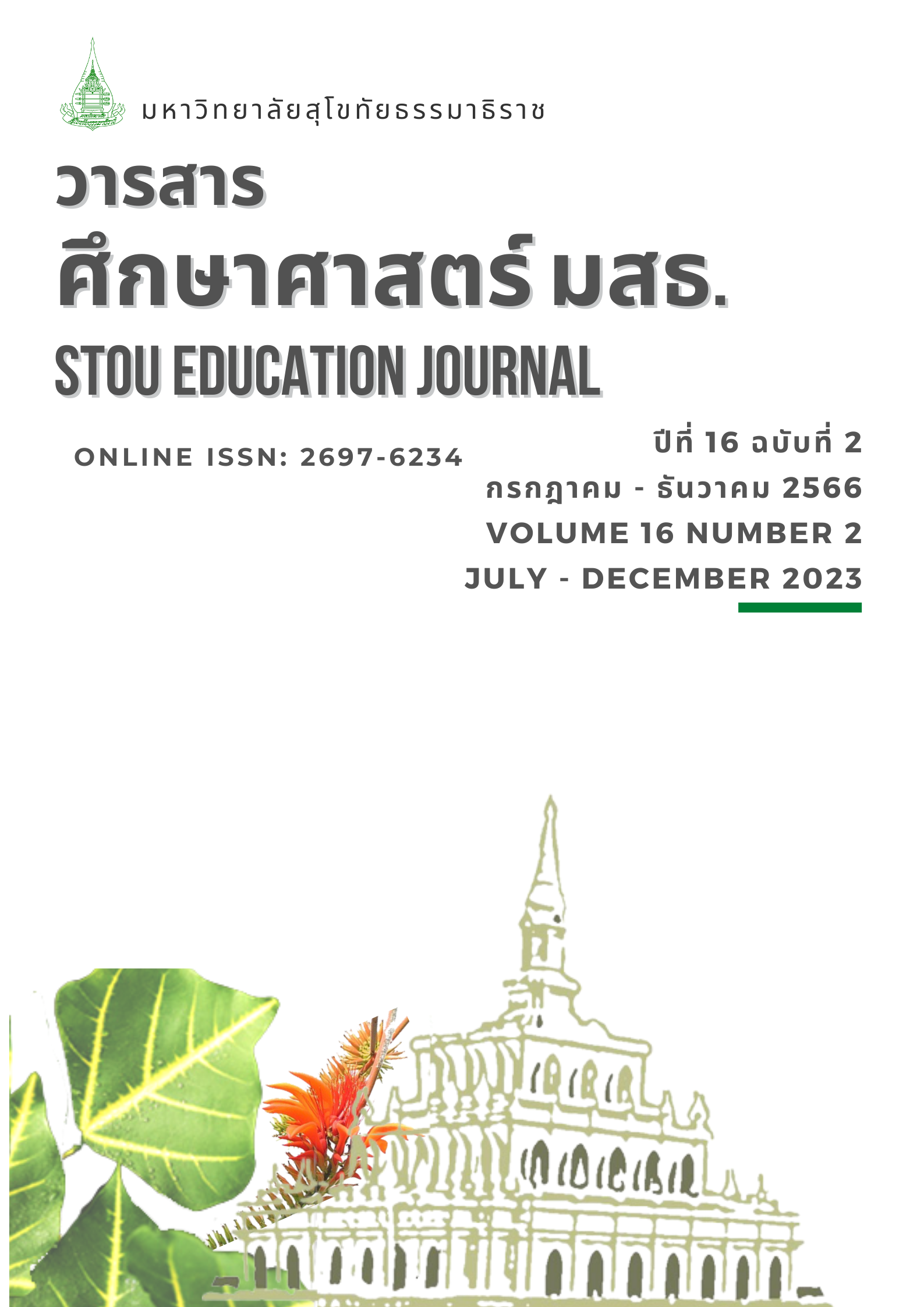The Development of an Instructional Model by Integrating Thai Food Wisdom for the Elderly Healthcare
Main Article Content
Abstract
The purposes of this research were to 1) develop an instructional model by integrating Thai food wisdom into practical health care for the elderly, 2) compare the ability to care for the elderly's health on food before and after learning through the instructional model, and 3) study the health development of the elderly after implementing the integrated instructional model. The sample consisted of 30 elderly individuals or the caretakers from Laem Fa Pha sub district selected through simple random sampling. The tools used in the research consisted of a document analysis form, an interview form, an instructional manual, an evaluation form, a record of the elderly’s health form, and focus group interview items. The statistics employed for data analysis were mean, standard deviation, nonparametric test (sign test) and content analysis. The results were as follows: 1)The developed instructional model, developed by integrating Thai food wisdom into practical health care for the elderly, was composed of 4 components: (1) Principle (2) Objective (3) Instructional steps: (3.1) Life Style Study (3.2) Independent Practice and Co-Observe (3.3) Feedback for Behavior Change (3.4) Expert Care and Coach (3.5) Evaluate and Reflect (3.6) Evolution of Life and (4) Condition of Achievement. The model was rated as appropriate at the highest level. 2) The ability to care for the elderly's health on food after learning was significantly higher than their pre-learning counterpart mean score at the .05 level of statistical significance, and 3) After the elderly learned through the developed instructional model, they exhibited higher health improvement.
Article Details
References
กิตติ วงศ์สาสวด. (2560). ปัจจัยที่ส่งผลต่อคุณภาพชีวิตผู้สูงอายุในจังหวัดภาคตะวันออก. วารสารชุมชนวิจัย, 11(2), 21-38.
ชวิศา แก้วอนันต์. (2561).โภชนาการสำหรับผู้สูงอายุ. วารสารวิชาการ มหาวิทยาลัยอีสเทิร์นเอเชีย ฉบับวิทยาศาสตร์และเทคโนโลยี, 12(2), 112-119.
นิจศิริ เรืองรังสี. (2542). เครื่องเทศ. จุฬาลงกรณ์มหาวิทยาลัย.
บุญเลี้ยง ทุมทอง. (2556). ทฤษฎีและการพัฒนารูปแบบการจัดการเรียนรู้. เอส.พริ้นติ้ง ไทยแฟคตอรี่.
ประจักษ์ เพ็ญโพธิ์. (2563). ปัจจัยที่มีความสัมพันธ์กับพฤติกรรมส่งเสริมสุขภาพของผู้สูงอายุอำเภอวังทรายพูน จังหวัดพิจิตร.วารสารวิชาการ สำนักงานสาธารณสุขจังหวัดมหาสารคาม, 4(8), 210-223.
พิมพิสุทธิ์ บัวแก้ว. (2559). การดูแลสุขภาพและภาวะสุขภาพของผู้สูงอายุไทย.วารสารสมาคมนักวิจัย, 21(2), 94-108.
ศรุดา นิติวรการ. (2557). อาหารไทย: มรดกทางวัฒนธรรมของชาติ. วารสารวิชาการ มหาวิทยาลัยราชภัฏพระนคร, 5(1), 171-179.
สุวัฒน์ วัฒนวงศ์. (2547). จิตวิทยาเพื่อการฝึกอบรมผู้ใหญ่. จุฬาลงกรณ์มหาวิทยาลัย.
สิริพัชร์ เจษฎาวิโรจน์. (2546). การจัดการเรียนการสอนแบบบูรณาการ. บุ๊คพอยท์.
อัจศรา ประเสริฐสิน. (2561). สุขภาวะของผู้สูงอายุ: แนวคิดและปัจจัยที่เกี่ยวข้อง.วารสารสุขศึกษา, 41(1), 1-15.
Glickman, C. D., Gordon, S.P., & Jovita, M. (2010). Supervision and instructional leadership: A developmental approach (8thed). Allynand Bacon.


